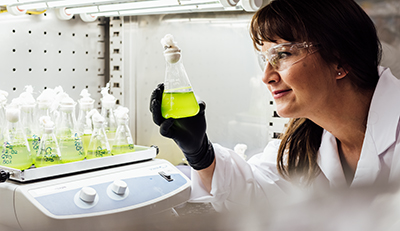The interdisciplinary green team
May 6, 2019
Share

Engineering a sustainable future requires input from multiple approaches and perspectives. Four leading Canadian researchers from Queen’s University have been awarded the NSERC Brockhouse Canada Prize for Interdisciplinary Research in Science and Engineering for their work in enhancing the value and sustainability of our natural renewable resources though collaboration.
Given annually to only one research team across Canada, the award supports the late Nobel Laureate Bertram N. Brockhouse’s vision of interdisciplinary teamwork and collaboration as a way to propel scientific discovery in Canadian research. Dr. Brockhouse won the Nobel Prize in Physics in 1994.
“The NSERC Brockhouse is one of the most prestigious and competitive research honours available to Canadian researchers,” says Kimberly Woodhouse, Interim Vice-Principal (Research). “We are proud of our Queen’s recipients, and proud that the university is a space that fosters interdisciplinary collaboration as a means to address critical challenges.”

The cross-faculty research team consists of Pascale Champagne (Civil Engineering, Chemical Engineering), Michael Cunningham (Chemical Engineering, Chemistry), Philip Jessop (Chemistry) and Warren Mabee (Geography and Planning, School of Policy Studies), each affiliated with the Beaty Water Research Centre and an accomplished scientist in their respective field. With the funding provided by the NSERC Brockhouse ($250,000), the team will work in unison bringing their unique but complementary expertise to designing solutions to address myriad problems caused by climate change.
The four team members share a passion for sustainable use of natural resources and the development of green industrial processes. Dr. Champagne is an expert in biofuels and utilization of water resources; Dr. Cunningham is a specialist in green engineering; Dr. Jessop works in the area of green chemistry while Dr. Mabee brings his experience with policy issues and assessing the sustainability of renewable energy and material systems.
All four researchers are affiliated with the Beaty Water Research Centre. Drs. Champagne, Jessop and Mabee are Canada Research Chairs. Dr. Cunningham was the Ontario Research Chair in Green Chemistry from 2010-2015.
“We pursue research on issues of critical importance to Canadians, including the development of alternate wastewater management strategies and environmentally sustainable approaches, green chemistry and engineering, and renewable energy policy,” says Dr. Champagne, the project’s principal investigator. “We are grateful to NSERC and the Government of Canada, for their ongoing support and understanding that Canadian leadership in complex research areas such as environmental sustainability, and true advances are only possible through collaborations that incorporate knowledge from different disciplines to create innovative and timely solutions.”
The team has been involved in projects that explore the feasibility of using algal systems for wastewater treatment and biofuel recovery. These integrated systems hinge on devising strategies that facilitate nutrient removal, disinfection and carbon dioxide fixation, enhancing algal growth and oil production, and reducing the environmental (carbon, energy, GHG, water) footprint; and evolving biomass conversion approaches to generate biofuels and bioproducts in an integrated carbon and energy recovery scheme.
They have also worked extensively on the use of carbon dioxide as an innovative and green “trigger” for stimuli-responsive materials. In addition to being abundant, inexpensive, nontoxic and environmentally benign, it does not accumulate in a system upon repeated cycles. They have explored and invented innovative methods to use carbon dioxide-switchable technology to address practical problems, including recent work on developing carbon dioxide-switchable materials for water treatment technologies.
For these and other projects, the successful integration and implementation of their research within existing Canadian infrastructure and industry remains a key challenges and can only be achieved through interdisciplinary research.
“Our research thrives because all four of us realize that we are not as capable individually as we are as a team. For our society to move towards a sustainable future, we need to abandon traditional academic silos and tackle these problems together,” says Dr. Champagne.
For more information on the award, visit the NSERC website.